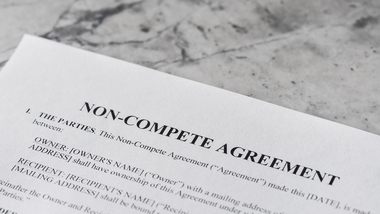Noncompete contracts (or clauses) are used to reduce competition by prohibiting former employees, and sometimes contractors and consultants, from (a) taking competing jobs after leaving your company or (b) starting a business that competes with your company. Noncompetes generally last from six months to two years. They affect 1 in 5 U.S. workers.
On Jan. 5, 2023, the Federal Trade Commission proposed a ban on noncompetes, saying that eliminating them will increase wages by nearly $300 billion a year. The rule would apply to employees and independent contractors, and to paid and unpaid work. It would require employers “to rescind existing noncompetes and actively inform workers that they’re no longer in effect.”
The FTC writes that noncompetes constitute “unfair methods of competition.” In other words, the FTC sees noncompetes as an imposition on employees. Many employees are forced to sign noncompetes because an employer makes it a condition of employment. The FTC may vote on the final rule relating to the proposed ban by April 2024.
Specifics of noncompetes
Noncompetes must specify the type of work or services that an ex-employee cannot provide — information, techniques, procedures and practices unique to the business. Competitors must be defined in the agreement — stating at least a general idea of the industry and types of businesses the employee agrees not to work in.
Noncompetes are common in media, financial services, corporate management, manufacturing and information technology. In most noncompete agreements, employers define the damages they are entitled to if an employee breaches the agreement.
A noncompete is advantageous for your company because it protects you from competition, legal challenges and loss of customers. However, noncompetes may discourage individuals from joining your company, especially if you also have confidentiality clauses. The limiting aspects of noncompetes are particularly seen if the employee has left a job with its own noncompete agreement. Some jurisdictions require a former employer to pay their ex-employee a base salary during the noncompete period.
Noncompetes are distinct from nondisclosure agreements, which generally don’t prevent an employee from working for a competitor. Sometimes called confidentiality clauses, NDAs prevent the employee from revealing information the employer considers proprietary or confidential — client lists, underlying technology or information about products in development.
Further details
Noncompetes are seen as beneficial tools for companies hoping to protect their position in the market, but the contract can’t be unreasonable. An unreasonable noncompete might include these characteristics:
- It might deny a raise or promotion to a current employee who refused to sign.
- It might not protect a legitimate interest, whether trade secrets, proprietary information or something else.
- It might last indefinitely. As mentioned above, a period of six months to two years is most common.
- It might define a large geographic area as the noncompete area; this would prevent former employees from making a living.
- It might not be limited in scope to the employer’s industry.
How noncompetes are enforced varies from state to state. Most states allow agreements that are considered reasonable.
Noncompetes give the employer control over specific actions of the employee, even after the employment relationship ends. They should be limited in scope. Ask an attorney to review your document and be aware that your employee will likely talk to an employment attorney before signing.




